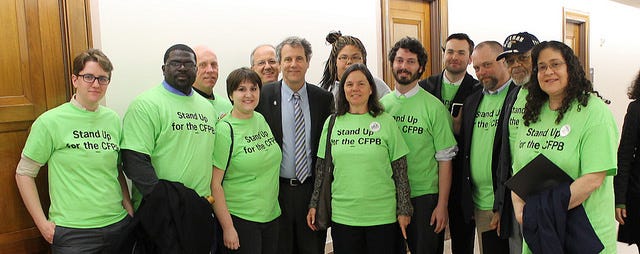What Should Be Done to Stop Banks Like Wells Fargo from Scamming Us?
By Jim Lardner, Americans for Financial Reform
Wells Fargo’s CEO John Stumpf deserves every bit of the anger that the Senate Banking Committee directed at him for leading Wells Fargo while it created more than 2 million fake deposit and credit-card accounts, and then charged unknowing customers for them.
Stumpf has tried to lay the blame at the feet of workers. But this was not the behavior of a few out-of-control workers. The problem was systematic, and it followed from Wells Fargo’s use of high-stakes sales quotas for its employees. As the Los Angeles City Attorney’s office explained in its lawsuit, these quotas were often impossible to fulfill, and yet employees who fell short were often fired.
But Wells Fargo’s failure points to a broader problem. After all, this is hardly the first time Wells has faced scrutiny for illegal acts. As Senator Sherrod Brown (D-OH) pointed out, this is only one of 39 enforcement actions that Wells has faced in the last ten years.
Wells Fargo has racked up over $10 billion in fines for offenses from racial discrimination in mortgage lending, to mortgage fraud, to violations of the Americans with Disabilities Act.
So what should be done to stop banks from scamming us? Americans for Financial Reform has five specific proposals.
Defend the agency that protects us from scams

After the financial crisis, Congress created the Consumer Financial Protection Bureau (CFPB) to protect Americans from financial scams. The Bureau has already returned over $11 billion to Americans scammed by their financial companies. And the CFPB was one of the three agencies took action against Wells for widespread unlawful sales practices, and is working to get refunds for all affected Wells Fargo customers.
Despite this, the agency is constantly under siege by Republicans in Congress. Mere days after the Wells Fargo scandal broke, the House GOP pushed a bill to systematically undermine the CFPB. The bill passed the House Financial Services Committee on a nearly-party-line vote: all but one Republican voted to weaken the CFPB, making it harder to expose and punish scams like the one at Wells. Not to be left out, Senate Majority Leader Mitch McConnell — whose wife Elaine Chao serves of Wells’ Board of Directors — has moved to advance a bill to end the CFPB’s dedicated funding.
Wells Fargo’s lawbreaking underscores the need for the CFPB as a strong independent regulator to protect consumers against financial abuse. We must keep fighting to protect the CFPB’s important work.
Crack down on out-of-control sales quotas that fuel fraud
Wells-like sales quotas are endemic in retail banking, as a National Employment Law Project report found. The Committee for Better Banks has been calling for an end to these quotas. Now that Wells Fargo has been caught defrauding customers, it announced it will end sales quotas, but even Stumpfadmits that it should have done so earlier.
The bank regulators should force banks to get rid of destructive quotas. The CFPB already requires institutions to ensure that sales goals don’t create “unintended incentives” to break the law. The Wells fiasco shows that all bank regulators need to be more vigilant in ensuring adherence to that standard across the industry.
No giant bonuses for scamming customers
In the Senate Banking hearing this week, Chairman Richard Shelby (R-AL) said to CEO Stumpf, the “buck stops here.”But so far, nothing has been done to claw back the more than $100 million in compensation that Stumpf himself received during the period of his company’s widespread misconduct. And the executive who oversaw the division where the fraud occurred is due to retire with nearly $125 million. We have called on Wells in a petition to claw back this absurd payday, and recover the bonuses received by Stumpf himself during the time period covered by the abuses.
But we shouldn’t have to depend on banks like Wells voluntarily doing the right thing. At this very moment, financial regulators are finalizing new rules about how and when executives get big pay packages. But the proposal they have put forward is flawed in multiple ways, including:
- It leaves it up to the company to choose whether to “claw back” an executive’s pay following wrongdoing, so company officials could choose to protect top executives.
- It limits clawbacks to cases of intentional personal misconduct. That standard makes it possible for executives to keep their bonuses by blaming widespread lawbreaking on their subordinates.
Regulators need to strengthen their proposed pay rules to ensure that executives who oversaw, enabled, or ignored illegality don’t get to walk away with giant bonuses.
Fight “ripoff clauses” that deny us our day in court
Buried in the fine print of many bank contracts are “ripoff clauses” that deny customers their day in court should their bank wrong them. They’re called forced arbitration clauses, and they kick any customer disputes out of court and into a private, secretive process called arbitration — where claims are decided by a private firm hand-picked and paid by the corporation, not a judge or jury.
Wells Fargo put these ripoff clauses into its account agreements. When Wells charged them for accounts they never opened, multiple customers sued. But the bank claimed ‒ successfully ‒ that because customers had these clauses in their real accounts, they could thwart customers bringing lawsuits against them for the fake accounts Wells Fargo opened up.
The CFPB is currently working on a new federal rule that would restore consumers’ ability to challenge bank and lender abuses in class action suits without having to wait for federal intervention. But just as far too many in the House Majority are fighting to gut the CFPB, too many in Congress are also trying to kill this new rule to fight ripoff clauses. We need to push the CFPB tomake this rule as strong as possible, not interfere with their ability to get the rule done.
Hold senior executives accountable when they break the law, civilly and criminally
One encouraging development in this case is the news that the Department of Justice (DOJ) is investigating. In the past, however, the DOJ has been reluctant to prosecute big banks’ top executives. Senator Elizabeth Warren (D-MA) has documented these enforcement failures in a report called “Rigged Justice: How Weak Enforcement Lets Corporate Offenders Off Easy.” During the hearing, Senator Warren didn’t just call for CEO Stumpf to be criminally investigated; she also made it clear how high the stakes are in this case:
This just isn’t right. A cashier who steals a handful of $20s is held accountable, but Wall Street executives who almost never hold themselves accountable, not now and not in 2008 when they crushed the worldwide economy. The only way that Wall Street will change is if executives face jail time when they preside over massive frauds.
The Wells Fargo scandal makes it clear that big banks continue to abuse their own customers. To stop this, we need to protect the CFPB’s work getting consumers their money back, end the quotas that encourage scamming customers, ensure bad behavior is no longer rewarded with big executive bonuses, demand that customers finally have their day in court when banks break the law, and hold senior executives accountable when they break the law. Otherwise, as Elizabeth Warren noted in the hearing with Stumpf, it’ll just be back to “business as usual.”

